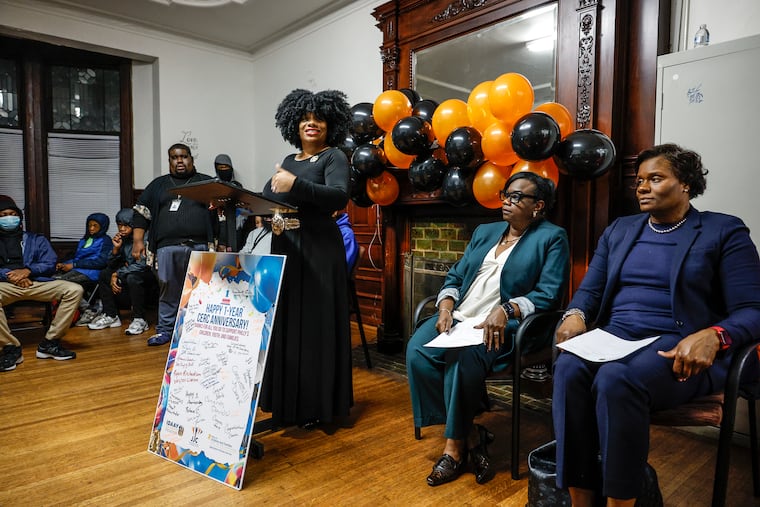IDAAY’s Curfew Center celebrates first birthday, growing pains and all
“This first year had ups and downs. We learned a lot,” IDDAY founder and executive director Archye Leacock said.

Between 2021 and 2022, more than 1,000 people in Philadelphia were killed primarily by firearms, and by the summer of 2022, gun-related violence had residents up in arms and demanding elected officials restore public safety.
Councilmember Katherine Gilmore Richardson responded to the outcry by creating Community Evening Resource Centers (CERC), safe spaces for police to take youth, ages 10 to 17, caught violating curfew. Now each of the city’s six police divisions have a local CERC, run by six different nonprofit community groups.
On Halloween, one of them — the Institute for the Development of African American Youth (IDAAY) — celebrated its CERC’s first birthday. IDAAY, which supports the Central Police Division, served almost 200 students in its first year. The center is open until 2 a.m. with structured activities from 7 p.m. until 9 p.m. including dinner, movies, and games as well as group discussions, help with conflict management and academic support.
“So city leaders visualized the Community Evening Resource Centers as safe places where vulnerable or disengaged young people would have a place to go that was safe, first of all, and [where] they could socialize, learn and engage between the hours of 7 p.m. and 2 a.m., particularly after the city started enforcing the curfew law,” explained Vanessa Garrett Harley, deputy mayor for the Office of Children & Families.
Despite cake, spooky decorations and a room full of high-energy youthful CERC participants, the birthday bash took on a decidedly somber note.
For the past year IDAAY has been working to help its youth stop violating curfew, increase their awareness of family support systems, and improve their educational outcomes. “This first year had ups and downs. We learned a lot,” IDDAY founder and executive director Archye Leacock said. “Thanks to DHS and the whole [CERC] unit we made it.”
CERC was part of Gilmore Richardson’s legislative push to update the city’s curfew law so teenagers 16 and older would be off the street by 10 p.m. instead of midnight. “We have to use every tool in our toolbox to protect our young people during the most violent time of the year,” Gilmore Richardson said after Mayor Jim Kenny signed her curfew bill into law in July 2022.
That change was to stay in effect only through the summer but was made permanent in December 2022.
» READ MORE: City Council approves a permanent 10 p.m. curfew for Philly’s teens
Angelic Bradley is IDAAY’s CERC program manager and she said that much of the first year’s growing pains were related to police and neighbors’ unfamiliarity with the program. She has spent the last half-year since she came onboard improving those relationships.
“They weren’t really aware of what the CERC was and what it offered. However, as we were able to build that rapport and speak to certain individuals, in the community they were more open to what we actually offered and what we did with the youth here at the CERC,” Bradley said.
It cost $750,000 per CERC, or $4.5 million annually to operate the six CERCs. According to Department of Human Services (DHS) statistics, 1,061 youth have made 9,597 visits to a CERC center since 2022. And the majority of the juveniles, about nine out of 10, were walk-ins coming to enjoy the free activities rather than youth brought in by police officers.
Researchers question the effectiveness of curfew but increasingly municipalities are turning to them to help manage juveniles’ public behavior.
This summer, for example, Ocean City, N.J., moved its teenage curfew to 11 p.m. to help manage rowdy minors after responding to almost 1,000 incidents including underage drinking, vandalism, and shoplifting in Ocean City over Memorial Day weekend. Merchants said it brought calm back to the boardwalk while police said it dispersed problems to other parts of the city.
» READ MORE: Ocean City’s curfews and beach closings ‘just displaced’ teen problem to rest of town, police chief says
IDAAY, while celebrating its birthday, is looking forward.
“We have a lot to celebrate today, particularly with the accomplishments here at IDAAY,” Garrett Harley said. “There’s been a reduction in curfew violations by youth involved in the program. There’s a change in attitude, I’m told, by many of the youth involved in the program.”
“We hope, in year two, it will be a much fuller and better program,” Leacock said.